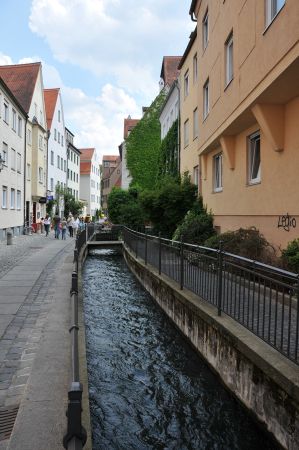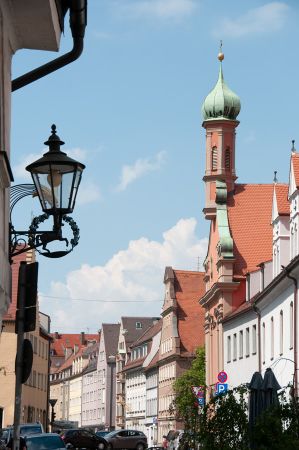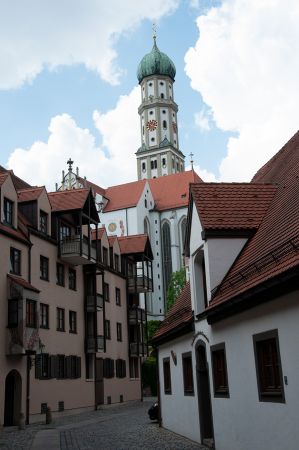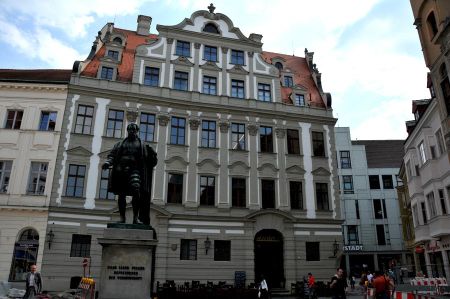City guide Georg and the first city trip through Augsburg
- Written by Portal Editor
The next morning, the owners Lydia and Georg are already away on business, we prepare our breakfast in the kitchen, where we are greeted by the two dogs present, wagging their tails. They are visibly pleased when we open the patio door for a first run into the garden.
We use the morning to deal with emails and make a few phone calls, because around 11:00 a.m. “city guide” Georg will drive us to Augsburg so that we can get a first impression of the city.
Augusta Vindelicorum remained an important supply depot
 The founding of the city of Augsburg goes back to a Roman legionary camp, which was founded in the district area of modern Oberhausen in 15 AD by the two stepsons of Emperor Augustus, Drusus and Tiberius, on his orders. As with many Roman military camps, it was only a matter of time before the first traders and craftsmen settled in the area to supply the camp. The settlement grew quickly and just a few years later, after Augusta Treverorum (Trier), one of the largest Roman settlements north of the Alps had arisen here. This was the origin of the settlement "Augusta Vindelicorum", which steadily increased in importance in the first century AD and received Roman city rights as early as 121 from Emperor Hadrian. Even if the army had already moved on over the years due to troop relocations, Augusta Vindelicorum remained an important supply depot for the Roman army.
The founding of the city of Augsburg goes back to a Roman legionary camp, which was founded in the district area of modern Oberhausen in 15 AD by the two stepsons of Emperor Augustus, Drusus and Tiberius, on his orders. As with many Roman military camps, it was only a matter of time before the first traders and craftsmen settled in the area to supply the camp. The settlement grew quickly and just a few years later, after Augusta Treverorum (Trier), one of the largest Roman settlements north of the Alps had arisen here. This was the origin of the settlement "Augusta Vindelicorum", which steadily increased in importance in the first century AD and received Roman city rights as early as 121 from Emperor Hadrian. Even if the army had already moved on over the years due to troop relocations, Augusta Vindelicorum remained an important supply depot for the Roman army.
Roman road from Mainz via Bad Cannstatt to Augsburg
 From about 95 AD, according to the records, Augusta Vindelicorum became the capital of the Roman province of Raetia, although Kempten in the Allgäu, then Cambodunum, also claimed this title well into the first century. However, archaeological finds today probably confirm Kempten's claim. Raetia's sphere of influence extended far into northern Italy. Finds are still being made that change the level of knowledge of archaeologists again and again and of course also previous opinions. This also includes the creation of the Neckar-Odenwald Limes under Emperor Trajan, which according to the latest knowledge was only created in 98 AD parallel to the construction of the Roman road from Mainz via Bad Cannstatt to Augsburg. Whether the completion of these two mammoth projects was accompanied by the relocation of capital rights to Augusta Vindelicorum can only be guessed based on the importance of the projects. Hopefully we will be able to collect more information as part of our project "Cultural Journey along Roman Roads" and put it online as reports.
From about 95 AD, according to the records, Augusta Vindelicorum became the capital of the Roman province of Raetia, although Kempten in the Allgäu, then Cambodunum, also claimed this title well into the first century. However, archaeological finds today probably confirm Kempten's claim. Raetia's sphere of influence extended far into northern Italy. Finds are still being made that change the level of knowledge of archaeologists again and again and of course also previous opinions. This also includes the creation of the Neckar-Odenwald Limes under Emperor Trajan, which according to the latest knowledge was only created in 98 AD parallel to the construction of the Roman road from Mainz via Bad Cannstatt to Augsburg. Whether the completion of these two mammoth projects was accompanied by the relocation of capital rights to Augusta Vindelicorum can only be guessed based on the importance of the projects. Hopefully we will be able to collect more information as part of our project "Cultural Journey along Roman Roads" and put it online as reports.
Fugger Chapel in the St. Anna Church in Augsburg
 With a slight delay, Georg then takes the short route from Kutzenhausen towards the center of Augsburg at around 12.00 p.m. Already on the way, Georg recommends starting the city tour with a meal in the market hall, which is also used by many locals as an inexpensive lunch menu and offers an international selection alongside local cuisine. We gladly accept the offer. As a fan of Indian cuisine, duck sweet and sour is just right for me, my wife is more interested in trying the local cuisine and therefore orders Schupfnudeln and roast pork with a crust. Both dishes are extremely tasty and really cheap.
With a slight delay, Georg then takes the short route from Kutzenhausen towards the center of Augsburg at around 12.00 p.m. Already on the way, Georg recommends starting the city tour with a meal in the market hall, which is also used by many locals as an inexpensive lunch menu and offers an international selection alongside local cuisine. We gladly accept the offer. As a fan of Indian cuisine, duck sweet and sour is just right for me, my wife is more interested in trying the local cuisine and therefore orders Schupfnudeln and roast pork with a crust. Both dishes are extremely tasty and really cheap.
We cross the pedestrian zone, which at the moment is more like a major construction site, in the direction of the Fugger social settlement. The Swabian merchant family Fugger was already a large company in the 14th century, dealing in the broadest sense with trade and thus becoming very wealthy. When Hans Fugger moved to the then free imperial city of Augsburg in 1367, the family's rise from pure weavers to merchants of cotton from Italy began. This laid the foundation for prosperity and influence. In the course of history there have always been family members who also made a name for themselves as art patrons and donors. The most well-known foundations include the Fugger Chapel in the St. Anna Church in Augsburg and the so-called Fuggerei, the oldest social settlement in the world that still exists today. Jakob Fugger, known as the Rich, donated the terraced housing estate consisting of 140 apartments in 67 houses in 1521 as living space for needy Catholic citizens of Augsburg. Even today, the "annual rental price" as cold rent is 0.88 euros! To this day, this settlement is run from the Jakob Fugger foundation assets. In return, the tenants undertake to pray the Lord's Prayer, a creed and an Ave Maria for the donor and his family once a day. We will try to get an appointment for further detailed questions during an upcoming visit with the administration of the social settlement.
Augsburger Puppenkiste - Jim Knopf and Lukas
 "City guide" Georg leads us further through the alleys of the old town of Augsburg, where we discover a large number of interesting restaurants and pubs. Certainly an extremely interesting corner towards the evening.
"City guide" Georg leads us further through the alleys of the old town of Augsburg, where we discover a large number of interesting restaurants and pubs. Certainly an extremely interesting corner towards the evening.
We want to stop by at least one other celebrity in Augsburg, the “Augsburger Puppenkiste”, Jim Button and Lukas, the engine driver or Urmel from the ice are still too much in our heads from our own youth. Today there is a museum in the historic Heilig-Geist-Spital, where performances of the puppet theater are also part of the program. In addition to a colorful variety of fairy tale performances, there is also a wide range of serious plays intended for adults or "big children". Numerous television productions in color helped the Augsburger Puppenkiste become well known and popular at the beginning of the 1960s, which are still known today under the names "Bill Bo and his cronies", "Little King Kalle Wirsch", "Tomcat Mikesch" and "Klecksi, the octopus” are remembered. Even today, the newly promoted FC Augsburg uses the title song " Eine Insel mit zwei Bergen " as the anthem for every goal they score.
"Grenzenlos Festival" and "Lechwood Open Air"
 After a visit to the Fugger Chapel of St. Anna Church in Augsburg, we return to the parking lot of our car, because on the way to Kutzenhausen we want to have a first brief conversation with the managing director of "Musikkultur für Augsburg e.V." (KUKI for short) Jürgen Gebhardt and the board member Michael Bernicker, also KUKI. This of course against the background of our project on the one hand, but of course also in order to continue to promote the exchange of musicians between Augsburg and Turkey in the future. We meet the two of them in their office during a conversation to prepare for the upcoming music highlights "Grenzenlos Festival" and "Lechwood Open Air". Since there has only been written contact with KUKI via email so far, the joy of the personal meeting is understandably great, despite the currently intensive preparation phase. We make an appointment for the next day for a detailed discussion in one of the restaurants that we had already seen during the tour, in order to discuss future activities together in detail.
After a visit to the Fugger Chapel of St. Anna Church in Augsburg, we return to the parking lot of our car, because on the way to Kutzenhausen we want to have a first brief conversation with the managing director of "Musikkultur für Augsburg e.V." (KUKI for short) Jürgen Gebhardt and the board member Michael Bernicker, also KUKI. This of course against the background of our project on the one hand, but of course also in order to continue to promote the exchange of musicians between Augsburg and Turkey in the future. We meet the two of them in their office during a conversation to prepare for the upcoming music highlights "Grenzenlos Festival" and "Lechwood Open Air". Since there has only been written contact with KUKI via email so far, the joy of the personal meeting is understandably great, despite the currently intensive preparation phase. We make an appointment for the next day for a detailed discussion in one of the restaurants that we had already seen during the tour, in order to discuss future activities together in detail.
But now it's finally in the direction of Kutzenhausen, because Lydia is already expecting us for dinner. After fruitful talks while processing the day's experiences, it's relatively early to rest afterwards. Tomorrow is a new day.
Please read as well:
Hiking Ebrach - thousand-year-old oak in the Steigerwald
Pretty Village Karmi (Karaman) - next to Kyrenia
-
 City Hike in Augsburg with Georg
City Hike in Augsburg with Georg
City Hike in Augsburg with Georg
City Hike in Augsburg with Georg
-
 City Hike in Augsburg with Georg
City Hike in Augsburg with Georg
City Hike in Augsburg with Georg
City Hike in Augsburg with Georg
-
 City Hike in Augsburg with Georg
City Hike in Augsburg with Georg
City Hike in Augsburg with Georg
City Hike in Augsburg with Georg
-
 City Hike in Augsburg with Georg
City Hike in Augsburg with Georg
City Hike in Augsburg with Georg
City Hike in Augsburg with Georg
-
 City Hike in Augsburg with Georg
City Hike in Augsburg with Georg
City Hike in Augsburg with Georg
City Hike in Augsburg with Georg
-
 City Hike in Augsburg with Georg
City Hike in Augsburg with Georg
City Hike in Augsburg with Georg
City Hike in Augsburg with Georg
-
 City Hike in Augsburg with Georg
City Hike in Augsburg with Georg
City Hike in Augsburg with Georg
City Hike in Augsburg with Georg
-
 City Hike in Augsburg with Georg
City Hike in Augsburg with Georg
City Hike in Augsburg with Georg
City Hike in Augsburg with Georg
-
 City Hike in Augsburg with Georg
City Hike in Augsburg with Georg
City Hike in Augsburg with Georg
City Hike in Augsburg with Georg
-
 City Hike in Augsburg with Georg
City Hike in Augsburg with Georg
City Hike in Augsburg with Georg
City Hike in Augsburg with Georg
-
 City Hike in Augsburg with Georg
City Hike in Augsburg with Georg
City Hike in Augsburg with Georg
City Hike in Augsburg with Georg
-
 City Hike in Augsburg with Georg
City Hike in Augsburg with Georg
City Hike in Augsburg with Georg
City Hike in Augsburg with Georg
-
 City Hike in Augsburg with Georg
City Hike in Augsburg with Georg
City Hike in Augsburg with Georg
City Hike in Augsburg with Georg
-
 City Hike in Augsburg with Georg
City Hike in Augsburg with Georg
City Hike in Augsburg with Georg
City Hike in Augsburg with Georg
-
 City Hike in Augsburg with Georg
City Hike in Augsburg with Georg
City Hike in Augsburg with Georg
City Hike in Augsburg with Georg
-
 City Hike in Augsburg with Georg
City Hike in Augsburg with Georg
City Hike in Augsburg with Georg
City Hike in Augsburg with Georg
-
 City Hike in Augsburg with Georg
City Hike in Augsburg with Georg
City Hike in Augsburg with Georg
City Hike in Augsburg with Georg
-
 City Hike in Augsburg with Georg
City Hike in Augsburg with Georg
City Hike in Augsburg with Georg
City Hike in Augsburg with Georg
-
 City Hike in Augsburg with Georg
City Hike in Augsburg with Georg
City Hike in Augsburg with Georg
City Hike in Augsburg with Georg
-
 City Hike in Augsburg with Georg
City Hike in Augsburg with Georg
City Hike in Augsburg with Georg
City Hike in Augsburg with Georg
-
 City Hike in Augsburg with Georg
City Hike in Augsburg with Georg
City Hike in Augsburg with Georg
City Hike in Augsburg with Georg
-
 City Hike in Augsburg with Georg
City Hike in Augsburg with Georg
City Hike in Augsburg with Georg
City Hike in Augsburg with Georg
-
 City Hike in Augsburg with Georg
City Hike in Augsburg with Georg
City Hike in Augsburg with Georg
City Hike in Augsburg with Georg
-
 City Hike in Augsburg with Georg
City Hike in Augsburg with Georg
City Hike in Augsburg with Georg
City Hike in Augsburg with Georg
-
 City Hike in Augsburg with Georg
City Hike in Augsburg with Georg
City Hike in Augsburg with Georg
City Hike in Augsburg with Georg
-
 City Hike in Augsburg with Georg
City Hike in Augsburg with Georg
City Hike in Augsburg with Georg
City Hike in Augsburg with Georg
-
 City Hike in Augsburg with Georg
City Hike in Augsburg with Georg
City Hike in Augsburg with Georg
City Hike in Augsburg with Georg
-
 City Hike in Augsburg with Georg
City Hike in Augsburg with Georg
City Hike in Augsburg with Georg
City Hike in Augsburg with Georg
-
 City Hike in Augsburg with Georg
City Hike in Augsburg with Georg
City Hike in Augsburg with Georg
City Hike in Augsburg with Georg
-
 City Hike in Augsburg with Georg
City Hike in Augsburg with Georg
City Hike in Augsburg with Georg
City Hike in Augsburg with Georg
-
 City Hike in Augsburg with Georg
City Hike in Augsburg with Georg
City Hike in Augsburg with Georg
City Hike in Augsburg with Georg
-
 City Hike in Augsburg with Georg
City Hike in Augsburg with Georg
City Hike in Augsburg with Georg
City Hike in Augsburg with Georg
-
 City Hike in Augsburg with Georg
City Hike in Augsburg with Georg
City Hike in Augsburg with Georg
City Hike in Augsburg with Georg
https://www.alaturka.info/en/germany/bavaria/5624-city-guide-georg-and-the-first-city-trip-through-augsburg?layout=default%2Famp%2Famp%2Famp%2Famp%2Famp#sigProId9ba0d276b6

